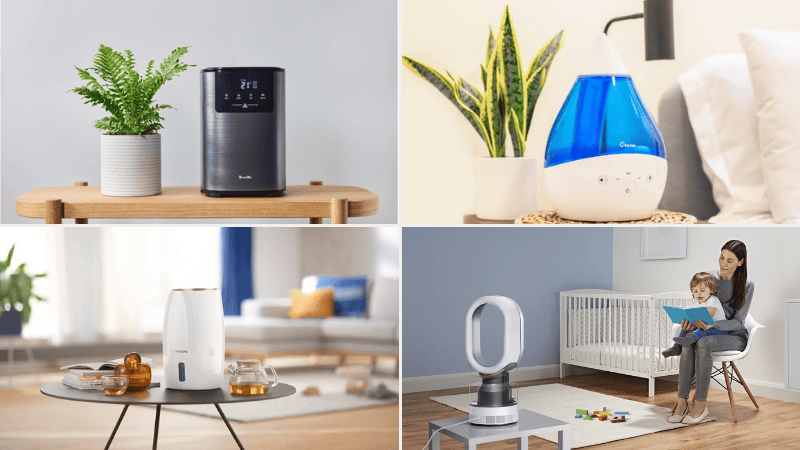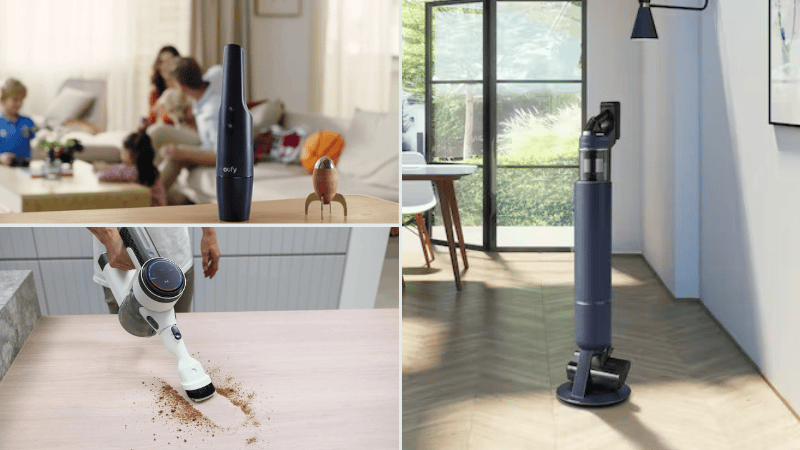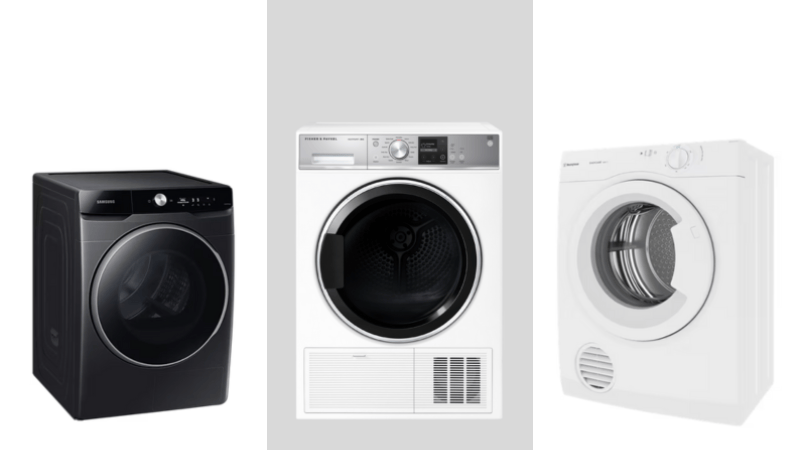Are you trying to decide between a heat pump and a condenser dryer for your home? This buying guide will compare and contrast the two to give you a comprehensive overview of each so that you can make an informed decision.
We will also compare heat pumps and condenser dryers in terms of their features, efficiency, cost, and more so that you have all the information needed to make an informed decision on which type of dryer is best for you!
Ready? Let's get started!
What is a Heat Pump Dryer?

A heat pump dryer is a type of clothes dryer that uses heat transfer technology to dry clothes. It does this by recycling the warm air inside the dryer and using it to heat up incoming air. This helps conserve energy by cutting down on electricity usage and reducing running costs. Heat pump dryers are also known for their quiet operation and being gentler on fabrics protecting them from shrinking and wearing away due to high temperatures.
What is a Condenser Dryer?
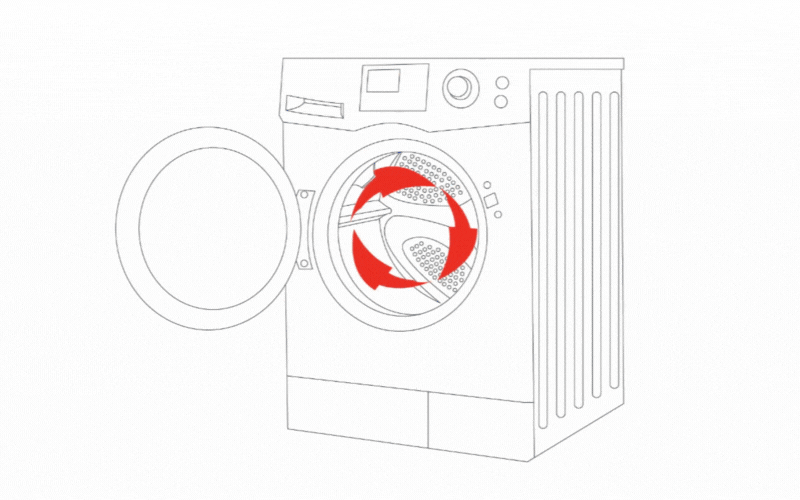
On the other hand, a condenser dryer uses a heating element to warm up incoming air before it is passed through the drum. Due to higher temperatures as compared to a heat pump dryer, condenser dryers are more efficient at drying clothes in less time. However, faster drying time comes at a cost - condenser dryers are less energy-efficient than their heat pump counterparts.
So now you know the basics of each type, let's dive into their pros and cons.
Pros and Cons of Heat Pump Dryers
What are the benefits and drawbacks of using a heat pump dryer? Let's explore.
Pros
Heat pump dryers are more energy efficient than condenser dryers, with some models using up to 50% less electricity than other types of dryers. This makes them a great option for those looking to save money on their electricity bills.
Additionally, they are gentler on fabrics as they operate at lower average temperatures as compared to condenser dryers. And when it comes to the product's lifespan, heat pump dryers tend to last longer than condenser dryers.
Cons
On the downside, heat pump dryers take a little longer to dry clothes. An 8 kg load of laundry can take around 2:45 hours to dry in a heat pump dryer, compared to 2:15 hours for a condenser dryer (drying cycles vary from model to model).
They also cost more than other types of dryers, which can be a deal-breaker if you're budget-conscious. Newer models are designed with noise-reduction technology.
Pros and Cons of Condenser Dryers
Do the drawbacks of the heat pump dryer outweigh the positives of the condenser dryer? Let's explore.
Pros
One of the main advantages of a condenser dryer is a shorter drying cycle. This is especially beneficial for those looking to get their laundry done quickly or those who need to run several laundry rounds in one day.
Condenser dryers are also generally more affordable than heat pump dryers, making them a better option for those on a budget. Plus, being more compact, they can also fit into most small-sized laundry rooms.
Cons
The main downside of a condenser dryer is that it is less energy efficient than a heat pump dryer, meaning it will cost you more in electricity bills. As condenser dryers operate at higher average temperatures, they are also more likely to cause damage to fabrics over time, leading to colour fading, shrinking, or wearing.
Lastly, condenser dryers are more technology-intensive than traditional vented dryers. The drying process involves more components and technology than traditional vented dryers, which increases the likelihood of them breaking down or needing repairs over time.
Heat Pump vs Condenser Dryer: At a Glance
Now, let's have a quick look at which type of dryer is better in different categories to help you decide.
- Energy efficiency: Heat pump dryers are the clear winner here, with almost half the electricity usage of condenser dryers.
- Initial cost: Condenser dryers typically have lower upfront costs and are more affordable than heat pump dryers.
- Load capacity: Condenser dryers are the better option here, with slightly larger load capacities than heat pump dryers.
- Drying time: When it comes to drying time, condenser dryers tend to be quicker than heat pump dryers.
- Lifespan: Heat pump dryers usually last longer than condenser dryers.
Heat Pump vs. Condenser Dryer: Which is the Best?
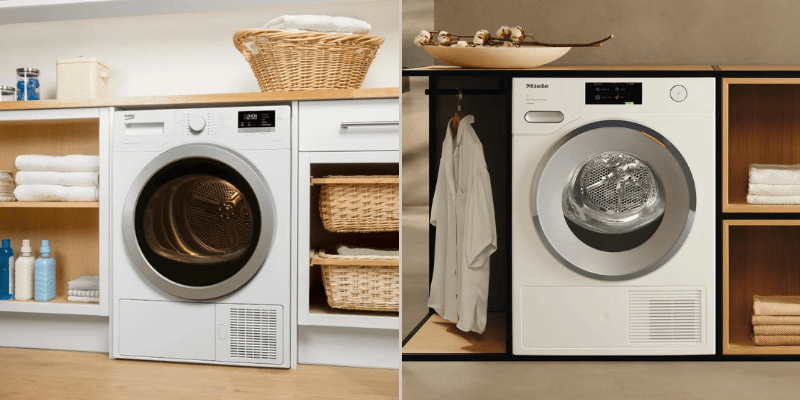
Condenser dryers and heat pumps have their own advantages and disadvantages, so it's important to consider which features are most important to you before making a decision. Here are the situations where each type works best:
Choose a Heat Pump If:
- You want to save money on your electricity bills
- You need a gentler drying cycle that won't cause damage to fabrics over time
- You are comfortable paying slightly more upfront
- You don't mind a longer drying cycle
- Your average laundry load is not that large
Choose a Condenser Dryer If:
- You need your laundry done quickly
- You are on a budget and want the less costly option
- You don't mind paying slightly more on your electricity bill over time
- You have a large family and need a larger load capacity
Frequently Asked Questions (FAQs)
Here are some frequently asked questions about the use, benefits, and drawbacks of heat pump dryers and condenser dryers.
What are the disadvantages of a heat pump tumble dryer?
The main disadvantage of a heat pump tumble dryer is that they tend to have higher upfront costs than condenser dryers. Additionally, they can take longer to dry clothes.
However, if you want to save money on electricity bills, a heat pump tumble dryer is the way to go. You can also expect them to last longer than condenser dryers and be gentler on fabrics.
Is it worth buying a heat pump dryer?
Yes, it is definitely worth buying a heat pump dryer. Not only are they more energy efficient than condenser dryers, but they also tend to be gentler on fabrics. Additionally, heat pump dryers usually have a longer lifespan than condenser dryers, which can save you money in the long run.
Ultimately, the “heat pump vs condenser dryer” debate comes down to individual preferences and needs, as both types have pros and cons. When making your decision, make sure to weigh up all your options.
What is the difference between a heat pump and a condensing dryer?
The main difference between heat pumps and condensing dryers is their energy efficiency. Heat pump dryers are more energy efficient than condenser dryers, meaning they will be more pocket-friendly in the long run. They are also gentler on fabrics, with lower average drying temperatures.
Condenser dryers are not without their advantages, though. They tend to be more affordable upfront and have larger load capacities than heat pump dryers. Additionally, they are generally faster than heat pump dryers, with shorter drying times.
Do heat pump dryers leave clothes damp?
No, despite the fact that heat pump dryers take slightly longer than condenser dryers to dry clothes, they should not leave them feeling damp. If your clothes come out of the dryer damp, it usually means an issue with the drying cycle. Make sure to check the user manual for your machine and adjust the settings accordingly. If the problem persists, it may be time to contact a professional for help.
Wrapping Up!
Between the heat pump and condenser dryer, the winner depends on your individual preferences and needs. If you are willing to pay slightly higher upfront costs and don't have a large capacity requirement, then a heat pump dryer is the way to go. They keep your clothes in better condition, save you money on electricity bills, and last longer than condenser dryers.
On the other hand, if you are looking for a low upfront cost, large capacity, and quick drying time, then a condenser dryer may be the right choice. But you will have to compromise on energy efficiency and fabric care.





